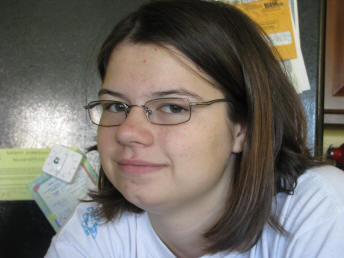Moments of Panic
Kat Dart

(1/2011) "Panic is a sudden sensation of fear which is so strong as to dominate or prevent reason and logical thinking, replacing it with overwhelming feelings of anxiety and frantic agitation consistent with an animalistic fight or flight reaction."
There are times in our life when we panic. People show their panic in different ways. Some become an unmovable statue, content with just waiting for it to be over. Some go into a nervous frenzy, worrying until they make themselves sick. For some people, they totally become one-track minded.
For mostly everyone, we look for someone to blame, someone to yell at. Times when we can’t do anything. Perhaps, during a panic, that is the worst part: the feeling of being utterly helpless, hearing no information, sitting there and wondering what went wrong, and where do I go to fix this?
After that initial wave is over, we want to know who we go to. Why did this happen? Who can I blame for it? Why couldn’t I stop it? And yet, in the end, you are too thankful to let any hint of negative emotions run through your head.
Last month, my younger sister was involved in the Emmitsburg Elementary bus accident. From what I hear, a utility truck with a ladder tied to the roof went through the emergency door. We didn’t hear anything until about 4 o’ clock. Naturally, my mom was worried. We learned about a half hour later that there were injuries, but most were minor, but we
still couldn’t go see for ourselves until around five o’ clock.
When we did go get her, we passed my Dad who was driving home after a long day in Chambersburg. Mom told him what happened through the car window, and as we drove to the school we watched him turn around and follow.
When we got my younger sister, we learned she had been only three seats from the back, yet absolutely nothing, no glass or anything, got to her. That was when we calmed down. We didn’t care what had happened; only that she was okay. That moment of panic, where we don’t know anything, where we couldn’t get any information, where we heard there were
injuries but no names were said had dissipated as quickly as it collected.
Later that night, she reflected on the irony of the accident. At the time of the incident, she was reading a book called When Sirens Wail.
I was thinking about the aftermath of the bus accident, why everyone was willing to stop everything. Why, even though we were told everything was okay, I chose to stay at home, then go with Mom to get Olivia instead of following some prior plans. Miriam insisted on coming along for the ride. Dad turned around in the middle of Brookfield. Elizabeth ran
to the car and demanded explanations.
I don’t think many people are familiar with Eudora Welty’s A Worn Path. In it, an old woman named Phoenix makes a long journey over the river and through the woods to go to town, to pick up some medication for her grandson, who injured his throat by swallowing lye two to three years ago. She works only with a one-track mind: help her grandson, no
matter what she has to do to help.
The ending is rather ambiguous, leaving many people confused as to whether Phoenix’s grandson is alive or not. Welty explained that she felt the theme of the story was about the path traveled, and not the ending destination. It doesn’t matter whether the grandson was alive or not, because Phoenix was still willing to travel the path to help him.
Welty had also explained her concept of the worn path mentioned in her story. The path is worn because it is a "habit of love," which I interpreted as love being the thing that makes her travel the path, and love has made her travel it often enough for it to wear down. It may be one of the longest journeys she’ll take, but she will do it over and over
again.
I believe this relates to us in the way that our love for another family member made us all willing to forget about plans, and tiredness, in order to go get her. To see her ASAP without hesitation. To travel our path to ensure she got back to us.
As Jean Paul Richter puts it, "All loving emotions, like plants, shoot up most rapidly in the tempestuous atmosphere of life."
Read Other Articles by Kat Dart